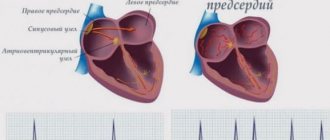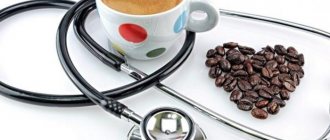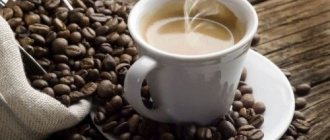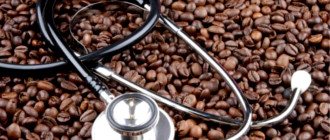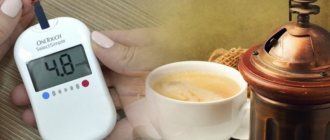Irina Baranova
Cardiologist
Higher education:
Cardiologist
Kuban State Medical University (KubSMU, KubSMA, KubSMI) Level of education - Specialist 1993-1999
Additional education:
“Cardiology”, “Course on magnetic resonance imaging of the cardiovascular system”,
Research Institute of Cardiology named after. A.L. Myasnikova
"Course on functional diagnostics"
NTsSSKh them. A. N. Bakuleva
"Course in Clinical Pharmacology"
Russian Medical Academy of Postgraduate Education
"Emergency Cardiology"
Cantonal Hospital of Geneva, Geneva (Switzerland)
"Therapy course"
Russian State Medical Institute of Roszdrav
Contacts
Patients suffering from cardiovascular diseases often wonder whether it is possible to drink coffee if they have heart arrhythmia or whether it is better to refrain from drinking this drink. Paradoxically, scientists have not yet come to a consensus on this issue. Some experts argue that caffeine should absolutely not be consumed, while others believe that in small doses it will not harm. We will try to understand this issue.
How does coffee affect the cardiovascular system?
Almost any cardiologist will begin to dissuade a patient suffering from abnormalities in the functioning of the cardiovascular system from drinking coffee. It is believed that all strong drinks containing caffeine provoke the development of tachycardia. Many doctors in domestic clinics think so. But modern studies of coffee and the cardiovascular system conducted in Europe show that if you drink several cups of this drink a day, then nothing bad will happen to you.
The most interesting experiment was carried out by scientists from the USA and Denmark. They divided people suffering from arrhythmias into 2 groups. The first one did not take coffee at all, including in instant form. The second was allowed to drink this drink in unlimited quantities. During the test, approximately 2% of all patients were hospitalized. And all of them belonged to those people who drank coffee 1-2 times a week or did not drink it at all. So taking this drink is not only not dangerous, but also useful.
Three cups of coffee a day improves heart rate after a heart attack
A healthy heart beats in a certain rhythm, but with some diseases this rhythm is disrupted - arrhythmias
, which are divided into
atrial
and
ventricular
depending on the part of the heart where the failure occurred.
The cause of most arrhythmias lies in a change in the state of the autonomic nervous system
, which regulates the activity of all internal organs.
One of the common and dangerous heart rhythm disorders is atrial fibrillation
, or
atrial fibrillation
, when the atria begin to contract quickly and chaotically, the efficiency of the heart decreases, which can result in heart failure or stroke.
Many doctors advise patients suffering from cardiovascular diseases, including arrhythmias, to avoid caffeinated drinks, as it is believed that it can provoke abnormal heart rhythms. But how justified is this recommendation? Australian scientists analyzed the results of a survey of about 230 thousand people to identify the connection between the consumption of drinks containing caffeine and the incidence of arrhythmias. It turned out that among “caffeine addicts” the frequency of episodes of atrial fibrillation was not only not higher, but even several percent lower than among the rest.
Another study, conducted on 103 patients who had suffered a myocardial infarction, showed that the average daily dose of caffeine, equivalent to three cups of coffee, only improved their heart rate. As for ventricular arrhythmias specifically, the safe dose was 6 cups of coffee per day - the risk of developing such a disorder increased only in coffee addicts who drank 9-10 cups daily.
What is the reason for such beneficial effects of caffeine? adenosine, among others, takes part in the regulation of heart rate.
.
On the one hand, it is a structural element of nucleic acids - DNA and RNA, on the other hand, it plays the role of a neurotransmitter
in the synapses of neurons in the brain, having an inhibitory effect on the nervous system and mediating the feeling of fatigue.
It is commonly used as a medicine to stop some tachycardias
, conditions in which the heart rate increases sharply, but it does not treat atrial fibrillation.
Chemically, adenosine is classified as a purine
, as well as caffeine, which, by the way, is found not only in coffee seeds, but also in tea and mate leaves, cocoa fruits, and also in some other plants. Caffeine is able to bind to specific adenosine receptors and, in a sense, is its “antidote”: by occupying adenosine receptors, it blocks its action, and the person feels alert.
Scientists conclude that moderate consumption of coffee and tea may have a preventive antiarrhythmic effect due to the antagonism of caffeine and adenosine, as well as the antioxidant properties of these drinks associated with their other components. But with energy drinks, which contain from 160 to 500 mg of caffeine per can, you should be careful. Three quarters of patients suffering from heart disease complained of increased heart rate when consuming two or more of these doses per day.
And the last thing: statistics are statistics, but no one has canceled the individual reaction of the body to the same caffeine. Therefore, if you have heart rhythm disturbances, then it is at least unreasonable to abuse such drinks.
Photo: https://www.flickr.com
Prepared by Maria Perepechaeva
Is there a relationship between coffee and arrhythmia?
Research shows that there may be a slight increase in blood pressure if you drink a lot of coffee every day. But this is only true for those people who drink more than 2 liters of this drink. In reality, such patients practically do not exist. In addition, coffee itself will not cause ventricular arrhythmia. It will not be able to provoke myocardial infarction and other cardiovascular diseases, because is not their main cause. Therefore, a ban on coffee and other products containing a certain dose of caffeine is somewhat useless. When deciding to drink this drink, remember the following rules:
- coffee should be drunk in small quantities;
- nerve cells begin to suffer from large amounts of caffeine;
- To reduce the negative effects of caffeine, it is allowed to add a little cream or milk to coffee.
Impact of other caffeinated drinks
An editorial accompanying the publication states that other studies support the safety of drinking coffee in patients with arrhythmia. But other sources of dietary caffeine raise concerns. Thus, there are descriptions of cases of heart rhythm disturbances in patients after consuming large doses of caffeine and further physical activity. It should be taken into account that many drinks that contain caffeine contain excess amounts of sugar and calories, which, if consumed regularly, lead to completely different health problems. Although coffee consumption in normal doses does not affect atrial and ventricular arrhythmias, more research is needed on the safety of new beverages with marginal caffeine content or high energy content.
Draw your attention to! This article is not a call for self-medication. It is written and published to improve the reader's knowledge about his own health and understanding of the treatment regimen prescribed by the doctor. If you experience similar symptoms, be sure to seek help from a doctor. Remember: self-medication can harm you.
How many cups of coffee can you drink in a day if you have arrhythmia?
The main thing in everything is moderation. A whole liter of this drink can disrupt the heart rhythm even in a healthy person. If you drink 2-3 cups of coffee a day, then nothing bad will happen to you. But this measure is an average. Each person has an individual reaction to this drink. Some people tolerate the effects of caffeine and other components of natural coffee very well, while others feel ill after a couple of sips. The standards for coffee and other drinks are as follows:
- healthy person – up to 400 mg of caffeine;
- pregnant woman - 300 mg of caffeine.
This norm is daily, i.e. You can drink no more than 4-5 glasses of this drink in 24 hours. Do not forget that caffeine is included in various teas, so they also need to be added.
Question about individual intolerance
In practice, there are patients whose heart rhythm is disrupted when consuming caffeine. This fact does not allow us to completely deny the relationship between caffeine and arrhythmia. It was found that this phenomenon relates to individual intolerance. This allows us to reconsider the rule of advising patients to abstain from strong tea and coffee as a preventive measure for rhythm disturbances. The article proposes to conduct an experiment. If a single dose of caffeine does not cause unwellness, then the patient can safely drink his favorite drinks.
Is it possible to drink sweet coffee if you have arrhythmia?
Above we looked at cases where patients took lightly sweetened or regular coffee. It’s another matter if a person drinks very sweet coffee every day and believes that there is no relationship between it and arrhythmia. Sugar negatively affects the functioning of the cardiovascular system and metabolism. It disrupts the normal production of enzymes. When it enters the bloodstream in combination with caffeine, sugar causes the heart to pump faster. As a result, the pressure rises.
If you like coffee that is too sweet and your doctor has diagnosed you with arrhythmia, you will either have to change your taste preferences or give up the drink altogether. But there are exceptions here too. In some people, arrhythmia is accompanied by a sharp drop in blood pressure. Sweet, strong coffee will help normalize blood flow, which will lead to the elimination of symptoms of arrhythmia. In other cases, a sweet drink is allowed to be drunk only 1-2 times a day.
What diet to follow for atrial fibrillation?
There is no specially designed diet for patients with atrial fibrillation, but doctors suggest following the DASH diet , which is recommended for the prevention of heart disease and reducing the risk of heart attacks and strokes.
The heart-healthy DASH (Dietary Approaches to Stop Hypertension) diet consists of fruits, vegetables, whole grains, fish and poultry, and low-fat dairy products.
Examples of DASH diet menus: here and here.
A study published in Medicine in 2021 found that strict adherence to the DASH diet was associated with a reduced risk of stroke . And this is good news, since the relationship between atrial fibrillation and stroke has been established .
How are coffee, the central nervous system and arrhythmia related?
It is believed that coffee is extremely beneficial for the nervous system, but there are people who disagree with this statement. Upon careful examination of brain scans, one can notice that the structure of neural networks begins to change when this drink is abused. Most often, the area responsible for short-term memory is affected, i.e. able to remember events and phenomena that happened yesterday or today. Nerve impulses from the brain stop reaching the cardiovascular system normally, which can provoke arrhythmia.
On the other hand, 2-3 cups of coffee a day enhances a person’s cognitive functions. They increase vigor and improve the general condition of a person. Scientists from the Netherlands have diagnosed that drinking coffee among older people helps them improve their memory. They observed the experimental groups for 10 years. As a result, the group where people did not drink coffee at all demonstrated a decrease in mental activity by 7.5%. It's funny that in the same group the number of cardiovascular diseases, including various types of arrhythmias, increased.
Some studies suggest that people who enjoy drinking coffee are less likely to suffer from Parkinson's and Alzheimer's disease, i.e. The effects of this drink can be compared to the benefits of a good workout.
What is possible?
Frozen fruits and vegetables . They are even preferable to fresh ones, although it was previously believed that some nutrients and vitamins were lost when frozen. This is wrong. Fruits and vegetables that are frozen are harvested when fully ripe and using the most modern methods (for example, blast freezing), trying to preserve their nutritional value as much as possible. But during transportation to stores, which can take from several days to weeks, fresh vegetables and fruits lose their beneficial properties. In addition, they are harvested before they are fully ripe, which means they inherently contain fewer nutrients and vitamins.
Liquid . It is important for patients with atrial fibrillation to know that dehydration worsens symptoms. It is necessary to drink enough water and other liquids throughout the day, include foods containing potassium and magnesium - fruits, vegetables, fish, whole grains, beans, nuts, green leafy vegetables (but not dietary supplements).
Watch your calories
Maintaining a healthy weight is important to reduce symptoms of atrial fibrillation. Move more, count calories, eliminate sweets, baked goods, fatty and processed foods from your diet. Discuss your meal plan with a nutritionist, and use smartphone apps that help you count calories and determine the amount of calories and nutrients in foods (Lose It!, Fooducate, MyFitnessPal). They can be downloaded from the App Store and Google Play.
Join us on social networks!
Subscribe to Telegram!

